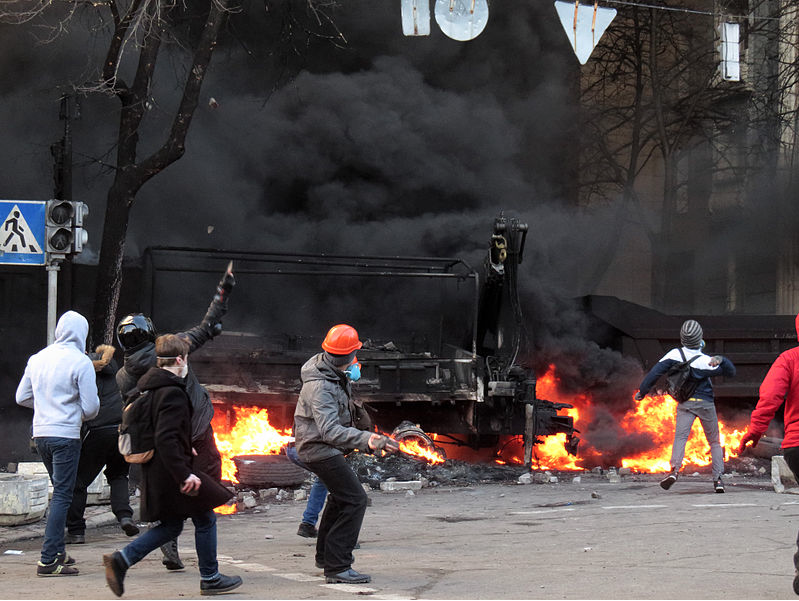While the maelstrom that has enveloped Russia-Ukraine relations continues to whirl, Israel has done its best to steer clear of the fray. The Jerusalem Post reported Israeli Foreign Minister Avigdor Lieberman’s statement on the matter: “[Israel’s] basic position is that we hope Russia and Ukraine will find a way as quickly as possible to normalize relations, and find a way to talks, and to solve all the problems peacefully.”
The United States has made its support for Ukraine crystal clear, voicing approval for economic sanctions against Moscow in the wake of aggressive behavior many consider reminiscent of Nazi Germany’s annexation of Sudetenland before World War II. Israel, however, has tiptoed the line of neutrality as carefully as possible, going so far as failing to appear at the United Nation vote on March 27 that “called on all states and international organizations not to recognize Russia’s annexation of Crimea.”
It is hard to fathom that Israel, a country so closely aligned to the United States on a great number of political, military and economic issues, can feel anything but bitter contempt for Russia’s bellicose disposition. Nevertheless, Israel has not made any public comments that could be interpreted as a commitment to one side or the other, opting instead to throw up its hands and take a hope-for-the-best approach.
Israel is undoubtedly fearful of angering Russia, a nation that could never be accused of unbridled love and admiration for the Israelis. Not only does Russia have significant clout with Iran and Syria (both sources of major concern for Israel), but it also has proven itself capable of almost anything with strongman Vladimir Putin at the helm. Although relations between Israel and Russia have been cautiously improving, the two nations are still “frenemies” at best and diametrically opposed at worst (much like the United States and Russia).
The relationship between Israel and the United States is thought to be less complex. Israel expects the U.S. government to support it unconditionally in the face of constant threats and relies on the most powerful military power in the world to act as a preventative shield against those who seek her destruction.
It is not shocking, then, that Israel’s abstention from a concrete position (more specifically, from a condemnation of Russia’s actions) has ruffled a few feathers in the U.S. camp (State Department spokeswoman Jen Psaki summarized the U.S. sentiment as “surprised”). The Financial Times reported that Israeli Prime Minister Benjamin Netanyahu, not noted for an aversion to strong opinions, quickly brushed the issue aside, stating that “I hope the Ukrainian thing is resolved quickly, amicably, but I have enough on my plate, which is quite full.”
True, Netanyahu is dealing with a rapid deterioration of peace talks with the Palestinian Authority (especially in light of the recent deal between Fatah and terrorist-run Hamas), but that should not excuse him from condemning Russia’s belligerence. The “Ukrainian thing”, as Netanyahu not-so-tactfully puts it, is already far past the point of no return when it comes to a quick and amicable resolution — the confrontation is just shy of a full-scale military operation, and blood has already been shed.
Netanyahu’s reticence to antagonize Russia is completely understandable, if not acceptable as a shrewd political move. Perhaps this conflict will simply blow over and Israel will succeed in flying just under the radar, neither vexing the United States due to a lack of verbal support, nor displeasing Russia with a firm stance. Moreover, Netanyahu could be choosing the lesser of two evils — a slightly miffed Obama is not a vengeful Putin.
Despite the political minutia involved, a perspective based strictly on principle leaves Israel with only one possible option — to express its unconditional support for Ukraine and the United States. After all, Israel knows better than most that a nation’s geographical integrity can be threatened by power-hungry neighbors with more substantial military might (at least in number).
In addition, if Israel and the United States are to maintain their strong bond, Netanyahu cannot selectively support the U.S. when it is convenient and sit on the fence when it is not. Having a plate that is too full does not excuse him from playing an active role in international politics — it is not as if the United States does not have any domestic issues to worry about.
If the crisis in Ukraine wraps up quickly and without much fanfare, Netanyahu may just be off the hook this time. But if Russia continues to push its agenda into Ukraine and further sanctions are enacted, Netanyahu should consider changing his tune and joining the United States in opposition to Putin’s aggression. At the end of the day, unconditional support between the U.S. and Israel must be a two-way street.

